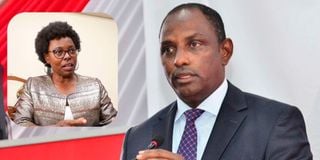
Former National Treasury Cabinet Secretary Ukur Yatani. Inset is Controller of Budget Margaret Nyakang'o.
A parliamentary committee wants Auditor-General Nancy Gathungu to conduct a forensic audit of Sh10 billion spent during President Uhuru Kenyatta's last days in office.
Among the amounts the MPs want audited is Sh6,091,140,702, which was paid for Helios Investment's exit from Telkom Kenya just three days before the August 2022 General Election.
The money, which was used to buy out Helios, was withdrawn under Article 223 of the Constitution and disbursed on August 5, 2022.
Parliament was supposed to approve the expenditure later, as required by law, but MPs have since refused to approve the payment.
The National Assembly Public Petitions Committee also wants a forensic audit of the Sh4 billion maize subsidy programme, which was paid to the Ministry of Agriculture on August 4, 2022.
The payment was also made under Article 223 of the Constitution, but MPs have since refused to approve it, questioning how it was used.
"The committee recommends that the Auditor General conduct a forensic audit to establish the alleged fraud, corruption and other financial irregularities in accordance with section 37 of the Public Audit Act, 2025," the committee report said.
Article 223 also allows the government to spend when a need for expenditure has arisen for a purpose for which no amount has been appropriated by the National Assembly.
This need can be a natural disaster such as floods, droughts and pandemics such as Covid-19, or an emergency that cannot wait for Parliament to appropriate funds.
However, in such circumstances, parliamentary approval must be sought later to regularise the expenditure.
The subsidy scheme was introduced by the government between July 19, 2022 and August 20, 2022 to curb the skyrocketing price of maize flour for consumers.
During this period, consumers bought a 2kg packet of flour for Sh100 instead of the prevailing market price of Sh210.
Contravention of law
The petition was presented to Parliament by the secretary-general of the Consumer Federation of Kenya, Stephen Mutoro, who asked MPs to order investigations into the Sh55 billion spent during the transition period between July and September in contravention of Article 223 of the Constitution
Mr Mutoro said in his petition that the Jubilee administration spent the money without parliamentary approval.
"The petitioner prays that the relevant laws be amended to prevent outgoing administrations from spending such public funds irregularly and make any other recommendations he may deem fit," the petition reads.
In his petition, Mr Mutoro expressed concern that the expenditure was made at a time when the country was grappling with a huge public debt, high inflation and a high cost of living.
In his petition, Mr Mutoro said the lack of transparency and accountability in the run-up to the transition from one government to another was worrying and a burden on the taxpayer.
He complained that independent institutions continue to suffer from political interference and in most cases cede their independence, especially when fiscal decisions have to be made.
In March last year, Controller of Budget (CoB) Margaret Nyakang'o told the committee chaired by Kitui East MP Nimrod Mbai that former Treasury Cabinet Secretary Ukur Yatani invoked the name of former President Uhuru Kenyatta to force her to approve expenditure of Sh15.2 billion.
The amount included Sh6 billion paid to Helios Investment Partners in Telkom Kenya and another Sh9.2 billion from the pension fund to finance some road projects that did not qualify for the fund.
Mr Yatani has, however, denied Dr Nyakang'o's allegations, describing them as false.
The former CS said the approvals he sought from Dr Nyakang'o were regular and in line with Article 223 of the Constitution and have since been approved by Parliament in the supplementary budget.
Records presented to the committee show that the Controller of Budget approved Sh2.8 billion as supplementary budget for flagship projects such as the Lamu-Ijara road upgrade, Sh4.8 billion for the Nairobi Eastern Bypass dualling, with both funds approved on August 5, 2022, just three days before the general elections.
On the same day, another Sh1.8 billion was withdrawn for the construction of the Makupa Causeway.
On August 4, the Ministry of Defence demanded Sh2.2 billion for the Level 4 Forces Research and Referral Hospital. The Ministry of Plant Development and Agriculture also demanded Sh4 billion for the implementation of the maize subsidy programme.
The Ministry of Petroleum and Mining requisitioned Sh16,597,436,070 to compensate oil importers under the petroleum pump price stabilisation. The appropriation was made on September 16, 2022.
The Ministry of Early Learning and Basic Education was allocated Sh4,121,665,433 on September 14, 2022 for quality of secondary education and improvement of projects under IDA.
The Sh411, 909, 902 requested by the Speaker was not approved due to lack of documentation.
However, Parliament has since approved all expenditures except the Sh4.5 billion for the maize flour subsidy programme and Sh6,091,140,702 for the acquisition of Telkom Kenya through the Supplementary Appropriation Act, 2023.
The committee noted that there are no safeguards to prevent an outgoing administration from incurring expenditure in case of emergency.
The Constitution gives the National Treasury leeway to spend as long as the amount is in line with the provisions of Article 223.





